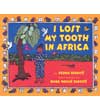 I Lost My Tooth in Africa
I Lost My Tooth in Africa |
Book Focus - December/January 2005
I Lost My Tooth in Africa
By Penda Diakité
Illustrated by Baba Wagué Diakité
To be published January 2006
In spring of 1997, we took a chance
on publishing Baba Wagué Diakité’s first book,
The Hunterman and the Crocodile. It came to me as a
little dummy via a freelancer who was working for Scholastic Productions
at the time, on The Magic School Bus television program.
Wagué was an unknown author/artist who was retelling an
old folktale – often the most difficult book to publish. But
I remember being struck by his authentic voice and the very beautiful
and unusual primitive art that he created on ceramic tiles. I also
remember being struck – much in the same way I was by Jon
J Muth’s book The Three Questions -- by the very resonance
of its message. The message was simple and clear.
Man must remember the importance of living in harmony with nature
and the necessity of placing himself among – not above –
all living things. It is the sort of message that reminds
me why I work in this field. It is no surprise that it was named
a Coretta Scott King Honor Book. And knowing his background,
it is also no surprise that Wagué’s unique authentic
voice so strongly shone through.
Wagué was born and raised in Bamako in Mali West Africa,
where he has long been known for his drawing and storytelling.
This is the way people in his culture teach children. His stories
are ones that have been passed down orally through ancestors for
thousands of years. Wagué tells them just the way he remembers
being told as a child, in the voice of his grandparents who helped
raise him. Through these stories children are taught morals
and life’s lessons through the ways of nature. They are also
taught respect for each other and for the world.
When Wagué moved to Portland, Oregon, twenty years ago,
he learned pottery making from his American wife, who is also an
artist. As he worked, he recalled as many of the stories as
he could from his childhood and drew them on pottery. This is the
way he taught himself English. His ceramic work is exquisite,
and he’s well known for it around the Pacific Northwest. A
good example of this can be seen in his book, The Magic Gourd,
where some of his bowls, plates and mud cloth designs are used as
storytelling devises.
His latest book, I Lost My Tooth in Africa, was written
by his 12-year-old daughter Penda. Penda grew up in Portland,
Oregon, and traveled with her family back to Africa each year to
visit their African family in Mali. Inspired by her
father’s storytelling and the family trips to Africa, Penda
told this story which actually happened to her when she was eight.
It was about the time her family was en route to Mali, when her
little sister, Amina, discovered she had a loose tooth. More than
anything, Amina wanted to lose her tooth in Africa so that she could
leave it under a gourd, and the African tooth fairy would bring
her two chickens! Would Amina lose her tooth in time? Would
she get her chickens? Would their eggs hatch before
they had to return to America? Who would care for the baby chicks
while she was gone?
When Wagué first told me his daughter had written a book,
I braced myself as I always do when a grownup sends me the work
of their “gifted child”. Before he even sent it
to me, I had composed the rejection letter in my mind. I worried
about how I would let the family down easily. But that wasn’t
even remotely necessary. When I read her first draft, I was
completely amazed! Her story showed talent, charm – and even
a genius in her sophisticated understanding of elements of telling
a story. Pacing, suspense, interesting and appealing characters.
She even has a distinctive voice!
I’m told that with the money Penda had made on her advance,
she bought video equipment and took film-making classes. She
had grown impatient waiting for the time it takes to produce a book.
She wanted faster results. So in the interim, she has also
become a prolific filmmaker. She has written and directed dozens
of her own short films (which are also quite amazing!) And
what of her little sister Amina, the main character in I Lost
My Tooth in Africa? Amina is now the star and stock character
of Penda’s films. Hopefully, as book reviews begin to come
in and the excitement builds, Penda will be inspired to write more
books. She’s been blessed with unusual talent and creativity
– and with parents who know how to help her channel it.
I have no doubt Penda will have many, many more stories to tell.
I hope so!